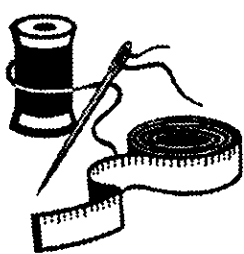Main Body
Chapter 9. Brother Art and I Answer Uncle Sam’s Call
In 1938, at the age of twenty-five, I had become the first male Assistant Head of a Branch Library in the history of the Cleveland Library System, at the Euclid 100th Branch. By 1941 at age of twenty-eight, I had been promoted to Branch Librarian, directing the work of a staff of sixteen people at one of Cleveland’s Carnegie branch library buildings known as the Woodland Branch Library located at 5806 Woodland Avenue. In May of 1943 at the age of thirty, I left that position in the Cleveland Public Library for military service.
After initial processing at Camp Perry, Ohio, I was assigned to the I.IS Army Air Corps and sent with a group of recruits for nine weeks of basic training to Gulf Port, Mississippi. Again father and mother reacted differently to this turn of events. Mother faced with sons leaving for military service in wartime, cried and prayed. Father took it more calmly and philosophically, accepting it as something that had to be done.
Upon completion of basic training, I was sent to Drew Field, an Army Air Corps Training Base located near Tampa, Florida. I arrived there in August, 1943 and was placed in a casual company to await assignment to a class to be trained as a radio operator. During this period of waiting, like all trainees awaiting assignment of one kind or another, I pulled K.P., garbage, latrine and police the area details.
One, bright, sunny afternoon, while engaged in the edifying job of policing the area, I was brought face to face with what may be called an accident of fate. I met Master Sergeant Frank Zamparelli in the area that I was policing. I should explain that policing the area means picking up cigarette butts and trash!
Master Sergeant Zamparelli and I recognized each other immediately. He said, “Ed, when did you get here? Why are you picking up butts? When I left home, you were a professional librarian working at the Cleveland Public Library! Why have you been assigned to Drew Field?” I explained that I had arrived about a week ago, that I was waiting to enter one of the radio operator training classes for eventual duty, for overseas assignment. He told me that he was attached to the post’s special service unit, that my arrival was fortuitous because Special Services was looking for someone with library training and experience to help catalog and process a collection of books stored in an empty barracks, awaiting the completion of a post library. He said that he would speak to Major Delano his superior officer about having me transferred to Special Services, that is, if I were interested! “Was I interested? Of course!” I jumped for joy at the chance to do what I was professionally trained to do! Within the matter of a week, I was transferred to Special Services!
By this time, brother Arthur had reported for duty as a medical officer at the officer reception center in Columbus, Ohio for processing. He was then sent to Fort Knox, Kentucky for his basic training and assignment to an Army Medical Unit.
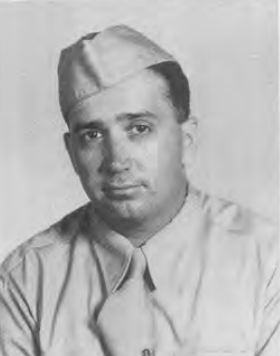
army buck private,
Drew Field, Florida, 1943
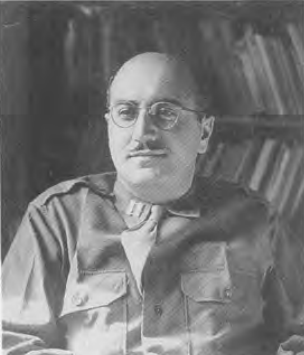
Commander, 67th Field Hospital,
Europe, 1945
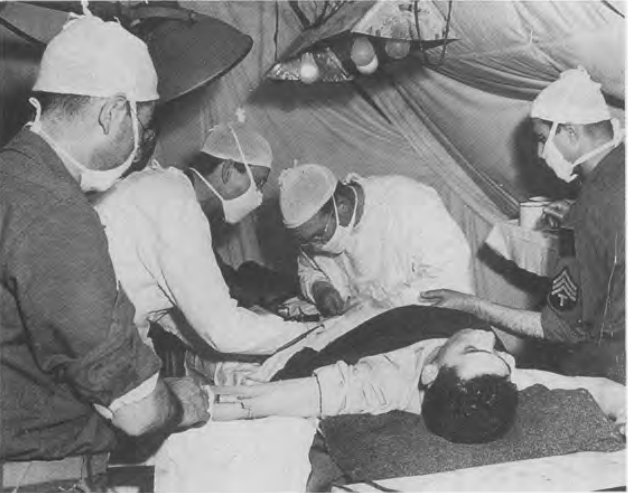
operating in Normandy, August, 1944
Courtesy of Press Association, Inc.
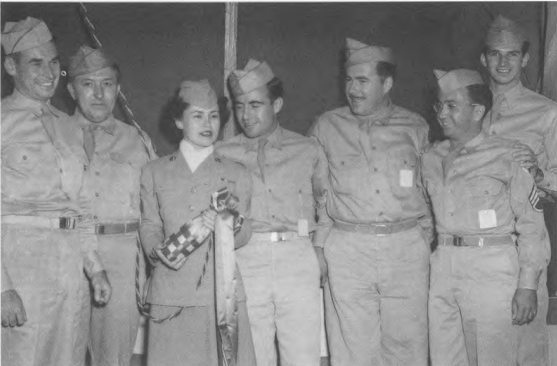
I, in the meantime, had been promoted to the exalted rank of Private First Class when transferred to Special Services to help get the new post library ready for opening by Christmas of 1943. From that point on, I worked with Hollis Warnock, a bright, young and very attractive civilian librarian. From the time we opened the library until December 1944, Hollis and I worked long hours, keeping the library open from 7:30 A.M. until 10:00 P.M. because it was so popular.
The fact that brother Arthur was now a medical officer and I was safely placed in an assignment that allowed me to practice my profession pleased both father and mother immensely. Father was especially proud. I recall brother Nick, who was now the letter writer for the family, writing to tell me that father was now boasting to all our neighbors about our special military assignments! Yes, it was now Nick’s turn to be the family scribe, just like I had been while he was away at medical school. Nick wrote to Arthur and me during our World War II service years, even though he was busy conducting his medical practice and serving his country as well, as medical examiner for the local Draft Board! During the war years, we continued to cooperatively support our parents. Arthur and I did our share by arranging for monthly allotments from our army pay, which the LIS Army Paymaster mailed directly to our parents each month. Twenty-two dollars of my thirty three dollar monthly Private’s pay” went home! Seven dollars was taken out for my Army Uncle Sam’s Call 55 Insurance. This left four dollars a month for pocket money. This improved somewhat as my rank improved with the passage of time.
In the Spring of 1944, brother Arthur was shipped to England with a group of surgeons, destined for surgical units being formed for active service. On June 6, D-Day, Arthur found himself in one of the Medical Auxiliary Surgical Units on his way for the invasion of Normandy. These units were the fore runners of what later became famous as the Medical Auxiliary Surgical Hospitals or MASH outfits of the Korean War!
December of 1944, found the US Army in need of infantry replacements. In December of that year, Germany launched its last ditch offensive, which became known as the Battle of the Bulge. The United States was also beginning to make plans for the invasion of Japan at that time. As a result an order went out to all US Army Air Corps Special Service Units to cull all “I-A Soldiers” from their rosters and to transfer them into the Infantry. “1-P’ meant totally physically fit. When the order arrived at the Special Services Headquarters at Drew Field where I was stationed, I was culled as one of the “l-A’s’! So by the middle of December 1944, I, with a number of other “1-s” were shipped from Drew Field, Tampa, Florida to Camp Gordon, located outside of Augusta, Georgia. We detrained around midnight of the 16th of December in a cold, driving rain at the Augusta Train Station. We were met by two hard boiled, and I do mean tough Infantry Sergeants, who lined us up at attention as we shivered in that bone chilling rain, dressed only in our light Florida Khaki uniforms, sans raincoats, completely unprepared for the weather we faced that night. After haranguing us about how they were going to make real soldiers “out of you fly boys,” they hustled us into waiting Army Trucks and carted us off to Camp Gordon. We arrived there around 1:30 A.M., lined up again and marched to our assigned barracks, where we were turned over to the barracks Sergeant, who in turn stood us at attention at the bunks that had been assigned to each of us. After he delivered his spiel about how he was going to make real soldiers of us, he delivered that last order that we were all painfully waiting for “Lights out!” With that, we crashed into our sacks and surrendered ourselves into the arms of Morpheus. It was 2:30 A.M.!
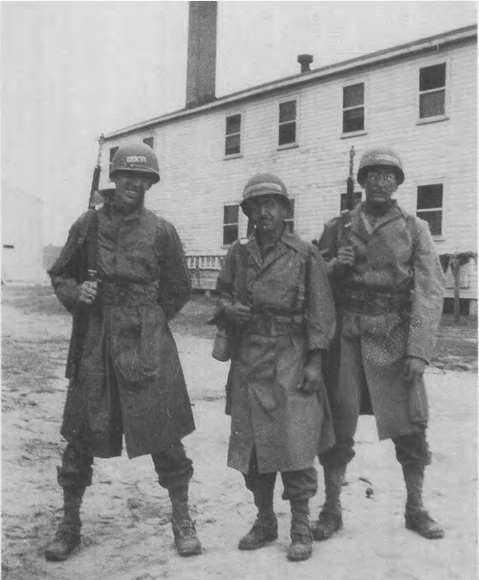
Camp Gordon, Georgia, 1944
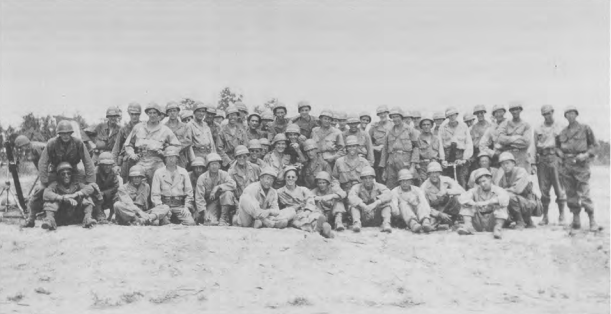
At reveille, we found out how really different our lives were to be in the infantry as opposed to the Air Corps. At Drew Field, reveille was at 5:30 A.M. At Camp Gordon reveille sounded at 5:00 A.M.! So it was, on that first morning, we were routed out of our sacks at that hour, after having had a mere two and a half hours of sleep. The barracks sergeant came screaming into the barracks, giving us one half hour to brush our teeth, shave, get into fatigues and out in front of the barracks in formation, at attention, by 5:30 A.M.! At which time, he yelled and screamed at us for about five minutes, giving us instructions about our processing schedule before marching us off to the Mess Hall for morning chow!
When father and mother heard that Arthur was now overseas and in the thick of the fighting in Normandy and that I had been transferred out of Special Services in Florida and was now in training for combat duty as an infantry man at Camp Gordon, Georgia, they were shocked! Realizing the implications of our new assignments, they were both distressed. Letters from brother Nick spoke of the difficulty that he and brother Sol had in calming our mother who cried and carried on. Father, on the other hand, again was more stoical about it all. I recall Nick reported that mother was finally reconciled when brought to her senses one day by something father said in Nick’s presence during one of her bad moments. I may not be quoting it verbatim after all of these years. Father warned her as follows: “Continue as you are, ranting about all the possible harm that might come to our sons, and you may very well find that your fears will come true! Is that what you want? Cast all these useless thoughts and fears out of your mind! Let us concentrate on good thoughts and pray that God will look after our boys and bring them back home to us safe and sound after all this is over with!”
Arthur, went on from the landing in Normandy through five campaigns in the European theater as a battle field surgeon operating on wounded soldiers on makeshift tables made of plywood placed on wooden carpenter horses in a mobile surgical unit housed in a tent. By the end of the war in Europe and at the time he completed his tour of duty, he had become the Commander of the 67th Field Hospital.
My tour of duty, however, took a different turn. At Camp Gordon, I was placed in Company A, a heavy weapons company, where I successfully completed the prescribed training course, which qualified me in the use of the 81 millimeter mortar, the 50 caliber machine gun, and carbine after nine weeks of training in the hot Georgia climate! From Camp Gordon I went with Company A to Camp Maxey, Texas where we were trained for the Invasion of Japan.
By the Spring of 1945, we were on our way to join the 10th Army as replacements. The 10th Army was being readied to invade Japan. Then on August 6, the first atomic bomb was dropped on Hiroshima destroying it. Three days later on August 9, a second atomic bomb leveled the seaport, industrial city of Nagasaki. The complete devastation of those two cities caused Japan to sue for peace. Namoro Shigomitso formally signed the surrender on behalf of Emperor Hirohito and the Japanese Government with General Douglas MacArthur signing as Supreme Allied Commander on board the U.S.S. Missouri in Tokyo Bay on September 2, 1945. So instead of going into Japan as an invasion trooper, within a month of the surrender, I, as a member of the 24th Corps of the 10th Army was shipped to Inchon, Korea, where I was assigned to the 545th Quartermaster Depot Company.
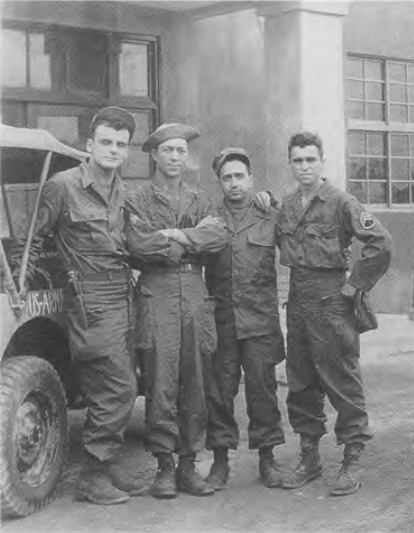
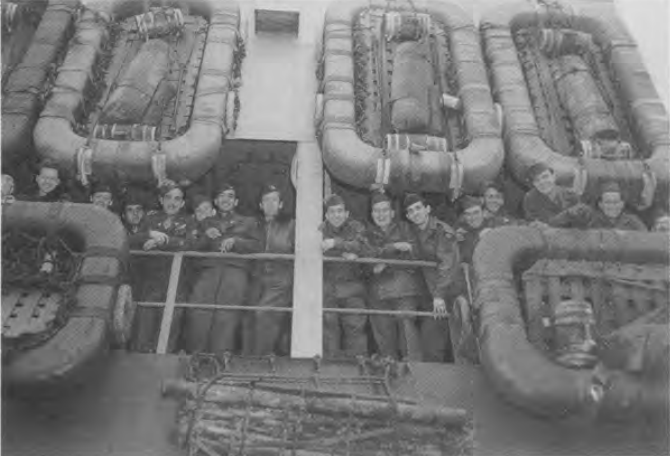
The 545th QM Depot Company was stationed in the GI dubbed Ascom City part of Inchon. While there, I served as the Ration Breakdown Non-Com. responsible for figuring and issuing food to our troops in the area. Company Mess Sergeants came to me with their ration requisitions for approval and allocation of the required rations according to a formula. Within a month or so we went from issuing K Rations to C Rations and finally to fresh foods when it was finally made available to us.
In January of 1946, brother Arthur was mustered out of the service and returned home having safely come through the dangers of war as a battlefield surgeon, much to the relief and happiness of father and mother and the rest of the family. I continued to serve in the 545th O.M Depot Company in Inchon, below the 38 parallel in South Korea, as part of the US Army of Occupation, while the Russian Army was occupying North Korea, above the 38th parallel. Our future at that time was still unknown. As far as we, who were part of the American Army of Occupation, holding the fort in South Korea, were concerned, we were still in the service for the duration! However, since hostilities with Japan had ended with the surrender in September, the minds of both mother and father about my safety had been eased and, of course, they were overjoyed to have Arthur back home and back in a surgical residency at St. Vincent Charity Hospital in Cleveland.
By the end of 1945, many of the South Koreans began to ask us, “when are you going home?” This was natural. After all who in any land would want to have foreign troops in their country for any length of time? It was not because we were creating any problems for them at the time. It was, as I believed then, and still do now, the normal reaction of a patriot of any nation! About that time, we learned that President Harry Truman had issued a directive for downsizing the Army and had setup a point system for gradually getting citizen soldiers out of the service and back home as soon as possible. In early February, I received word that I had finally accumulated the required number of points to be mustered out of the service along with a number of others in my unit. We were sent to an evacuation station at the Port of Inchon for processing out. We boarded troop ship US Admiral Eberle on February 14 and sailed for home on February 18. We arrived at the port of Seattle in the State of Washington on March 1, where we went through the first stages of the discharge process. On March 5, we were sent on to the Separation Center at Camp Atterbury, Indiana on a slow moving troop train, which took four days to get there because of the many unexplained stops that we had to make along the way! We arrived there on the 9th of March. It seemed like there were thousands of us there waiting to be discharged. It took five days for me to get processed through! However, at long last I finally got my Honorable Discharge papers early on the morning of March 14, given my mustering out pay, and train fare to Cleveland, Ohio. “I was finally on my way home, a civilian again!”
I arrived at the Cleveland Union Terminal at 7:30 A.M. on the morning of March 151 1946. Whenever I have walked or driven by that great tower of a building in the years that have passed since my arrival on that morning, I have felt that same sense of exhilaration and sense of freedom that I felt on that morning! I can see myself, in olive drab striding up the ramp of the main concourse, as it was at the time, feeling fit and full of vim and vigor, carrying only a brown leather shaving kit that brother Nick had given me when I left that same terminal almost three years before! I had left all other military” impedimenta behind! By the way, 64 My Father Was a Tailor I still have that old leather kit and I still carry it with me when I go on trips. It has become an icon for me, a symbol, because it went with me as an important part of my gear from basic training, through six Army Camps, to the Asiatic/Pacific Theater and back home!
When I came out of the Terminal Building, and got my first glimpse of Public Square, the sun was shining and the sky was clear blue, without a cloud to mar its azure beauty. I stood in the middle of the sidewalk, gaping at every part of the Square as people scurried around me, on their way to work. I asked a gentleman whether the Lorain Avenue street car still stopped on the square directly across from the Terminal? He nodded, at the same time pointing to the street car that was arriving at that very moment across the way. I thanked him and ran across the street just in time to board it for the last leg of my journey home.
